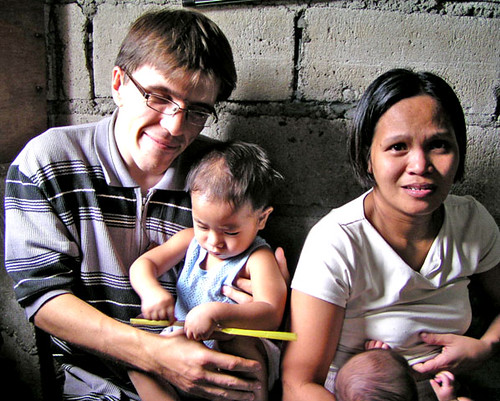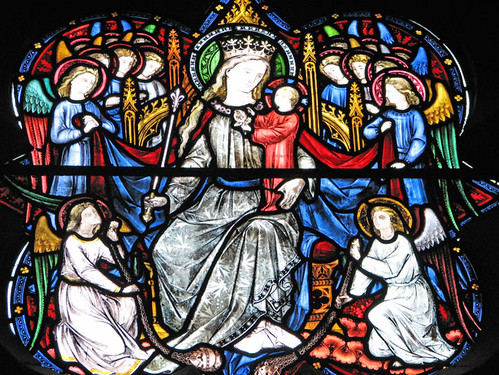"Love Your Neighbour as Yourself..."
 One of the many striking passages in Pope Benedict XVI's encyclical, Deus Caritas Est, is the honest observation that love cannot, in a sense, be commanded; and then the Holy Father's Christian response to the apparent paradox of Christ's divine injunction that is read in today's Gospel. As His Holiness notes in paragraph 16: "Moreover, love cannot be commanded; it is ultimately a feeling that is either there or not, nor can it be produced by the will." In the subsequent two paragraphs, the Holy Father explains how Christ's command is possible, because God Himself is the instigator and source of all human loving. He writes:
One of the many striking passages in Pope Benedict XVI's encyclical, Deus Caritas Est, is the honest observation that love cannot, in a sense, be commanded; and then the Holy Father's Christian response to the apparent paradox of Christ's divine injunction that is read in today's Gospel. As His Holiness notes in paragraph 16: "Moreover, love cannot be commanded; it is ultimately a feeling that is either there or not, nor can it be produced by the will." In the subsequent two paragraphs, the Holy Father explains how Christ's command is possible, because God Himself is the instigator and source of all human loving. He writes:"He has loved us first and he continues to do so; we too, then, can respond with love. God does not demand of us a feeling which we ourselves are incapable of producing. He loves us, he makes us see and experience his love, and since he has 'loved us first', love can also blossom as a response within us... Love of neighbour is thus shown to be possible in the way proclaimed by the Bible, by Jesus. It consists in the very fact that, in God and with God, I love even the person whom I do not like or even know. This can only take place on the basis of an intimate encounter with God, an encounter which has become a communion of will, even affecting my feelings. Then I learn to look on this other person not simply with my eyes and my feelings, but from the perspective of Jesus Christ. His friend is my friend. Going beyond exterior appearances, I perceive in others an interior desire for a sign of love, of concern... If I have no contact whatsoever with God in my life, then I cannot see in the other anything more than the other, and I am incapable of seeing in him the image of God. But if in my life I fail completely to heed others, solely out of a desire to be 'devout' and to perform my 'religious duties', then my relationship with God will also grow arid. It becomes merely 'proper', but loveless. Only my readiness to encounter my neighbour and to show him love makes me sensitive to God as well. Only if I serve my neighbour can my eyes be opened to what God does for me and how much he loves me."
Hence, the Christian vision is Christ's vision: seeing with the eyes of Christ. The difficulty one finds in achieving this is because we don't have Christ at the centre of our lives. Instead we are caught up in an ego-centric vision which is the condition of all humanity. How are we to transcend this and become more Christocentric? Pope Benedict writing in 1989, before his election to the Chair of St Peter, explains:
"To describe love of neighbour Holy Writ uses a very wise and profound phrase: 'Love your neighbour as yourself.' It does not demand any fantastic and unreal heroism. It does not say: 'You must deny yourself and exist only for the other; you must make less of yourself and more of the other.' No, it is as yourself: no more and no less. People who are dissatisfied with themselves will not be really good to others. True love is fair: where it is leading us is to love oneself as one of the members of Christ's body. Oneself like the others - becoming free of that false perspective with which we are all born, as if the world revolves around me and my ego.
Through faith we must all learn a kind of Copernican revolution. Copernicus discovered that it was not the sun that went round the earth but that this earth along with the other planets revolved around the sun. We all begin by seeing ourselves as a tiny earth around which all the suns must turn. Faith teaches us to leave this error and to behave like brothers and sisters, joining together with all the others in the round dance of love around the one centre that is God. Only if God exists, only if he becomes the centre of my life, is this 'love my neighbour as myself' possible. But if he exists, if he becomes my centre, then it is possible to reach this inward freedom of love."
Therefore, a truly Ecclesial sense of communion can help re-orientate us. The saints had a great sense of this and remain a sure guide; above all, the Blessed Virgin Mother who bore Christ within her blessed womb so that He was physically and spiritually the centre of her very being.
 We can share in Our Lady's experience of God's love and having Christ in our very being when we receive Holy Communion today (and indeed, everyday); when we receive the great gift of Christ's Body and Blood, we do well to remember that in Him, we are united with one another across time and space. Communion unites all of us - the people we don't like, that parishioner we don't get on with, the Catholic politician whose views we just don't share, that priest or religious we consider 'liberal' or 'conservative' or whatever other label we'd like to stamp on them. United in Christ's Mystical Body and washed in His Precious Blood, how can we not love our neighbours, our brothers and sisters in Christ? And that is the mystery and beauty of the Church: we're all together, sinners in need of Christ on the Barque of Peter - why do we keep pushing and shoving one another, bickering and squabbling like children in the back seat?
We can share in Our Lady's experience of God's love and having Christ in our very being when we receive Holy Communion today (and indeed, everyday); when we receive the great gift of Christ's Body and Blood, we do well to remember that in Him, we are united with one another across time and space. Communion unites all of us - the people we don't like, that parishioner we don't get on with, the Catholic politician whose views we just don't share, that priest or religious we consider 'liberal' or 'conservative' or whatever other label we'd like to stamp on them. United in Christ's Mystical Body and washed in His Precious Blood, how can we not love our neighbours, our brothers and sisters in Christ? And that is the mystery and beauty of the Church: we're all together, sinners in need of Christ on the Barque of Peter - why do we keep pushing and shoving one another, bickering and squabbling like children in the back seat?When we learn to love ourselves, by which I mean, one another in the one Body, the Church, because we truly appreciate God's love for us and are in Communion with Him (and one another), having Him at the centre of our lives, then we can begin to love our neighbours, those who are not of His One Flock and One Fold.
May Our Lady, Mother of the Church and Help of Christians pray for us and lead us into love and unity.
The photos above are of a friend, Gottfried, who was a lay missionary with Tahanang Puso in the Philippines and a stained glass window of Our Lady from the Dominican Sisters' Convent at Stone.







0 Comments:
Post a Comment
<< Home